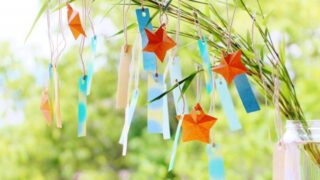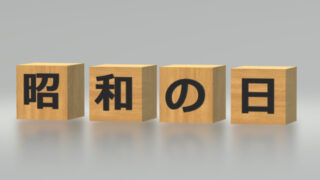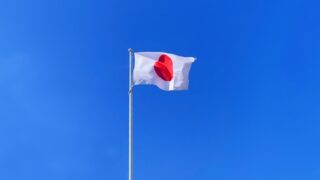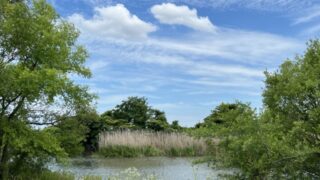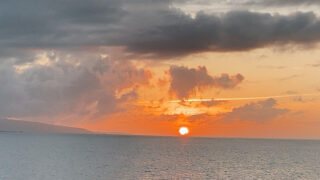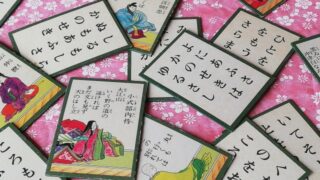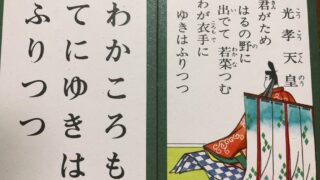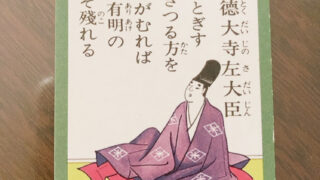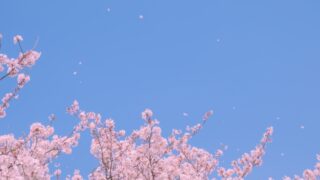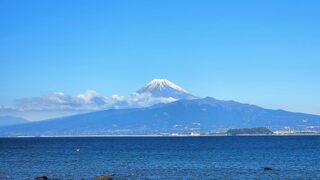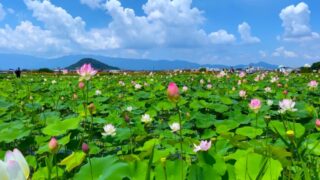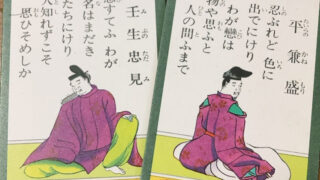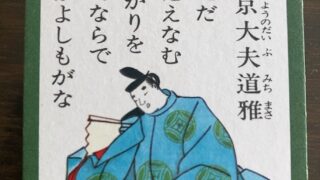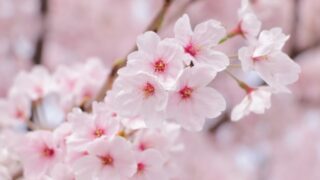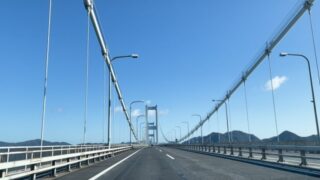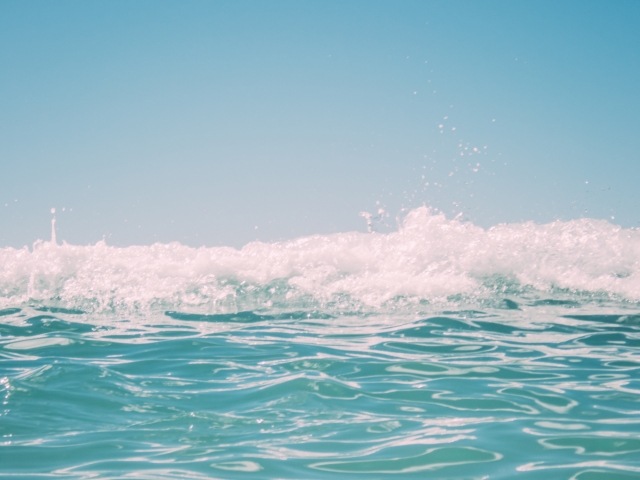8月も、もう終わりです。先週は大きな台風が日本に来ました。道路や畑が冠水したところもありました。冠水とは、道路や地面、畑など、普段水のないところが、水でいっぱいになることです。
今回も海の歌を紹介しますが、台風の日に、海や山、川に近寄るのは危険です。台風が近づいて来たら、なるべく安全なところにいてください。
August is going to end. Last week, a big typhoon hit Japan. Some roads and fields were flooded. Flooding means that the roads, ground, fields, and other places where there is normally no water fill up with water.
I introduce another poem about the sea. However, Going near the sea, mountains, and rivers on typhoon days is dangerous. If a typhoon is approaching, please stay as safe as possible.
わたの原 漕ぎ出でて見れば 久かたの 雲ゐにまがふ 沖つ白波
法性寺入道前関白太政大臣(1097-1164)
百人一首 七十六番 雑
「詞花集」
かな
わたのはら こぎいでてみれば ひさかたの くもゐにまがふ おきつしらなみ
「ゐ」は今は使われていないひらがなです。「い」と読みます。
今、日本で使われているひらがなは46文字、カタカナは46文字、合わせて92文字あります。今このブログを日本語で読んでいるみなさんも、最初に文字を覚えるのは大変だったでしょう。「ゐ」のような、現在使われていないひらがなは、100文字以上ありました。驚きですね。
また、ひらがなのいくつかは、今と異なる読み方をされていました。「まがふ」は「まごう」と読みます。
The “ゐ” is a hiragana that is no longer used. It is read as “い”.
There are 46 hiragana characters and 46 katakana characters used in Japan today, for all 92 characters. I am sure it was difficult to memorize the characters at first even though you are reading this blog in Japanese now. There were over 100 hiragana characters that are not used today, such as “ゐ.” Amazing, isn’t it?
Also, some of the hiragana characters were read differently than they are today. “まがふ” is read as ”まごう.”
言葉の意味
| わたの原 | 広くて大きな海 | Wide and big sea |
| 漕ぎ出でてみれば | 船で漕ぎ出してみれば | I row out in a boat and |
| 雲ゐ | 雲、雲のあるところ | Clouds or where there are clouds |
| にまがふ | と間違える | mistake (A for B) |
| 沖つ白波 | 沖の白い波 | White waves off the coast |
「ひさかたの」は、枕詞と呼ばれる言葉です。形容詞のひとつですが、枕詞にはあまり意味はありません。歌のリズムを整えるために使います。一緒に使う言葉が決まっています。「ひさかたの」は、光、空、月、雲、雨などの言葉といっしょに使われます。
以下のページも、枕詞を使った歌です。
”Hisakatano” is a word called a ”pillow word.” It is one of the adjectives but it does not have much meaning. They are used to set the rhythm of the poem. Certain words are used together. The word “Hisakatano” is used with words such as “light,” “sky,” “moon,” “cloud,” and “rain.”
The following link explains another poem that uses the pillow words.
現代語訳
広い海に船を漕いで出てみたら、雲と間違えるような沖の白波を見た。
I rowed my boat out into the wide ocean and mistook the white waves offshore for clouds.
青い海と沖の白い波が、まるで空と雲のように見える。そういう景色を詠んだ歌です。
The blue sea and white waves offshore looked like sky and clouds when he rowed out. This is a poem about such scenery.
前回紹介した歌「わたの原 八十島かけて 漕ぎ出でぬと 人には告げよ 海人の釣り舟」とよく似ている歌ですが、ずいぶん雰囲気が異なります。
「わたの原八十島かけて~」は、9世紀の歌です。作者、小野篁が罰を受けて、都から島に流される時に詠んだ歌です。「わたの原漕ぎ出でてみれば~」は12世紀に法性寺入道前関白太政大臣が詠んだ歌です。法性寺入道前関白太政大臣は高い位の貴族でした。
同じ海を見ていても、見えている景色は全く違うものになったはずです。「わたの原漕ぎ出でてみれば~」は、海の景色がさわやかな歌です。しかし、この後、貴族中心の時代から武士の時代になります。また海の見え方が変わったことでしょう。
This poem is similar to the previous one, “わたの原 八十島かけて 漕ぎ出でぬと 人には告げよ 海人の釣り舟” but the atmosphere is quite different.
”わたの原八十島かけて~” is a 9th-century poem. The author Onono Takamura composed this poem when he was punished and exiled from the capital to an island. “わたの原漕ぎ出でてみれば~” is a 12th-century poem by Hoseiji Nyudo, former Minister of the Grand Council of State for the Emperor’s Affairs. Hoseiji Nyudo was a high-ranking aristocrat.
Even though they were looking at the same sea, the view they saw must have been completely different. The sea view is refreshing in this song. After this, however, the aristocrat-centered era gave way to the samurai era. The view of the sea would have changed again.
海の見え方、地震や台風の時には大きく変わります。とにかく近づかないでください。台風の時、どのような行動をしたらいいか、以下のウェブサイトなどで、確認していてください。日本語や英語以外の言葉でも表示されます。
The view of the ocean, during earthquakes and typhoons, varies greatly. In any case, please stay away from the sea and rivers. Please check the following and other websites to see what you should do during a typhoon. It is also displayed in languages other than Japanese and English.
今日もここまで読んでくれて、ありがとうございました。
令和六年八月三十一日
